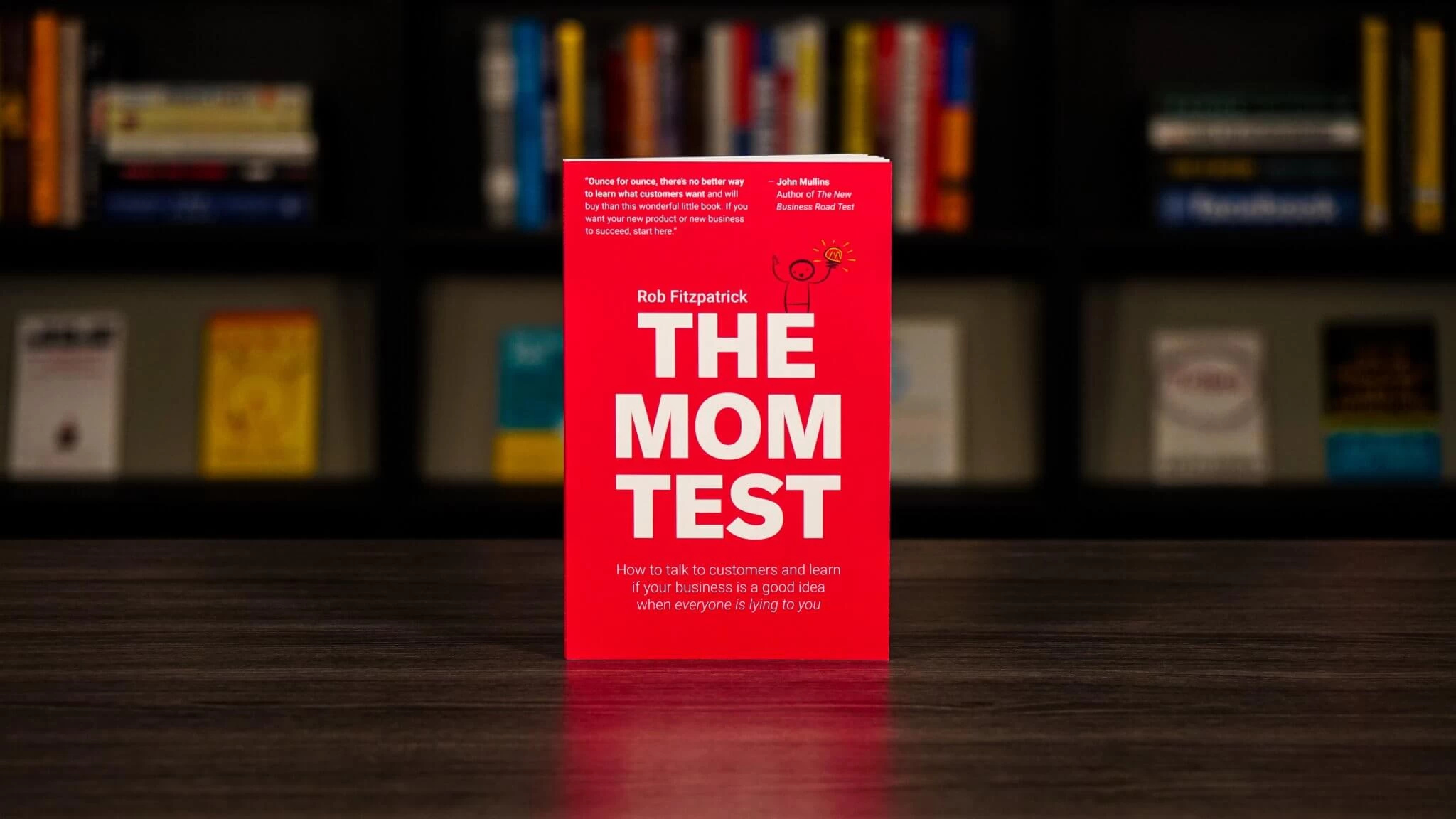Aug 29, 2021
"The Mom Test" - Book Summary
Just finished reading a book by Rob Fitzpatrick "The Mom Test: How to talk to customers & learn if your business is a good idea when everyone is lying to you". It's an excellent book - short, practical and to the point.
This book can be very helpful for Product Managers, User Experience Designers, someone who is planning to launch their own business and tech guys who are learning how to talk to customers.

Talking to customers is one of the foundational skills of both Customer Development and Lean Startup. We all know we're supposed to do it, but nobody seems willing to admit that it's hard to do it right.
Rob Fitzpatrick has done a great job sharing practical instruments to get to the valuable customer insights while not getting caught up in ego, complements and hollow promises.
He covers how to go about speaking to customers, where to find them, questions to ask (as well as questions to avoid), and how to structure the whole process.
> We know we ought to talk to customers. Many of us even do talk to customers. But we still end up building stuff nobody buys. Isn't that exactly what talking to people is meant to prevent?
🔑 Ideas and feature requests should be understood, but not obeyed.
🔑 If you've mentioned your idea, people will try to protect your feelings.
🔑 Every time you talk to someone, you should be asking at least one question which has the potential to destroy your currently imagined business.
🔑 Learning about a customer and their problems works better as a quick and casual chat than a long, formal meeting.
🔑 Keep having conversations until you stop hearing new stuff.
🔑 If you aren't finding consistent problems and goals, you don't have a specific enough customer segment.
🔑 There are three types of bad data: Compliments, Fluff (generics, hypotheticals, and the future) and Ideas.
🔑 Results of a good meeting are: Facts, Commitment or Advancement
When speaking to potential customers consider asking these questions:
Talk me through the last time that happened -- get as close to the real action as you can. It'll provide unique insights into murky situations. This question also helps you avoid asking something hypothetical.
Why do you bother? -- it's great for getting from the perceived problem to the real one.
What are the implications of that? -- some problems have implications and others exist but don't matter.
What else have you tried? -- if your potential customers haven't looked for ways of solving a problem already, they're not going to look for (or buy) yours.
Where does the money come from? -- often, you'll be talking to someone other than the budget owner. Find out who that person is.
This book can be very helpful for Product Managers, User Experience Designers, someone who is planning to launch their own business and tech guys who are learning how to talk to customers.

Talking to customers is one of the foundational skills of both Customer Development and Lean Startup. We all know we're supposed to do it, but nobody seems willing to admit that it's hard to do it right.
Rob Fitzpatrick has done a great job sharing practical instruments to get to the valuable customer insights while not getting caught up in ego, complements and hollow promises.
He covers how to go about speaking to customers, where to find them, questions to ask (as well as questions to avoid), and how to structure the whole process.
> We know we ought to talk to customers. Many of us even do talk to customers. But we still end up building stuff nobody buys. Isn't that exactly what talking to people is meant to prevent?
Key concept
The concept of "The Mom Test" is that when exploring an idea, you aren't allowed to tell people what their problem is, and in return, they aren't allowed to tell you what to build. They own the problem, you own the solution.Golden Nuggets
🔑 If they (potential customers) haven't looked for ways of solving it already, they're not going to look for (or buy) yours- Compliments are the fool's gold of customer learning: shiny, distracting, and worthless.🔑 Ideas and feature requests should be understood, but not obeyed.
🔑 If you've mentioned your idea, people will try to protect your feelings.
🔑 Every time you talk to someone, you should be asking at least one question which has the potential to destroy your currently imagined business.
🔑 Learning about a customer and their problems works better as a quick and casual chat than a long, formal meeting.
🔑 Keep having conversations until you stop hearing new stuff.
🔑 If you aren't finding consistent problems and goals, you don't have a specific enough customer segment.
🔑 There are three types of bad data: Compliments, Fluff (generics, hypotheticals, and the future) and Ideas.
🔑 Results of a good meeting are: Facts, Commitment or Advancement
Great questions
> Bad customer conversations aren't just useless. Worse, they convince you that you're on the right path. They give you a false positive that causes you to over-invest your cash, your time, and your team. Even when you're not actively screwing something up, those pesky customers seem hellbent on lying to you.When speaking to potential customers consider asking these questions:
Talk me through the last time that happened -- get as close to the real action as you can. It'll provide unique insights into murky situations. This question also helps you avoid asking something hypothetical.
Why do you bother? -- it's great for getting from the perceived problem to the real one.
What are the implications of that? -- some problems have implications and others exist but don't matter.
What else have you tried? -- if your potential customers haven't looked for ways of solving a problem already, they're not going to look for (or buy) yours.
Where does the money come from? -- often, you'll be talking to someone other than the budget owner. Find out who that person is.
Summary
"The Mom Test" by Rob Fitzpatrick is a must-read for anyone who is thinking of building their own business or starting their Product Management or UX career. Keep it on your desk, read, use the cheat sheet, make notes and refer to before and after each customer conversation.The saddest thing that can happen to a startup is for nobody to care when it disappears.
About Max Antonov
I'm a father of three from Sydney, a Product Director and a Product Coach. I write about product management and run the Product Manager community.
Feel free to reach out: [email protected].
Subscribe to receive digest emails (1 per month).
